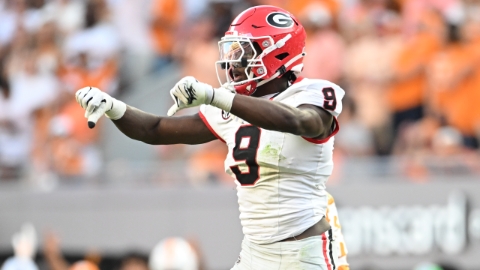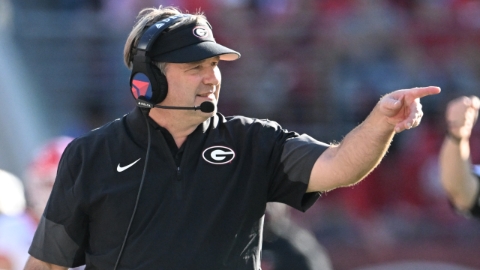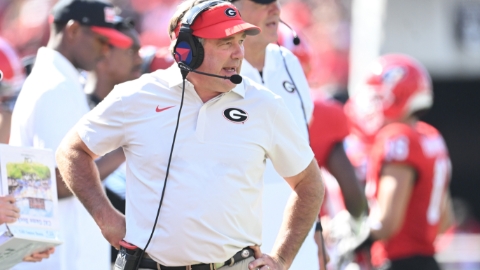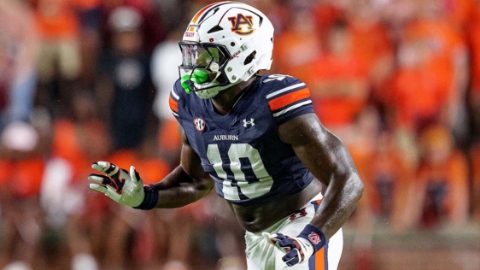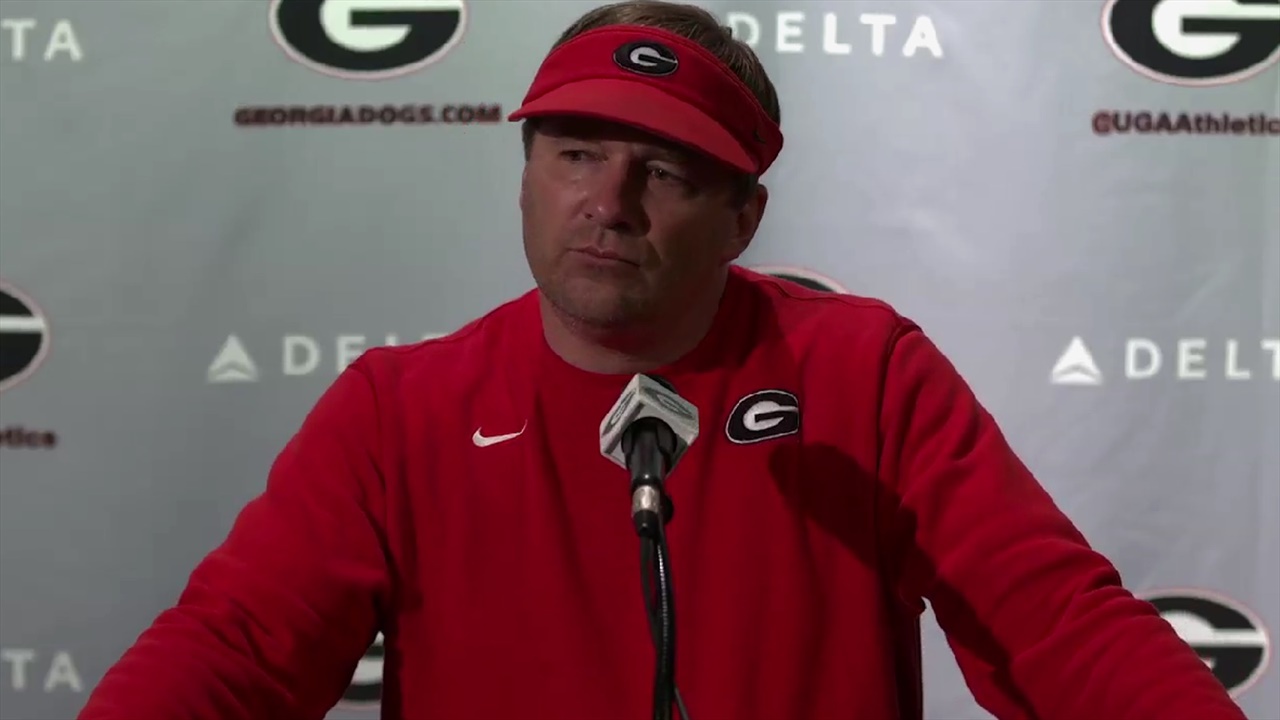
Kirby’s Opening Comments
‘’We got forced inside for a second day. We wanted to go outside but didn’t feel like it was safe. The grass is pretty wet and there’s a lot of moisture out there. So we went inside. The kids practice hard. I thought we got better. We did some good-on-good things and continued to compete and prepare for UMass.’’
On the physical status of OL Ben Cleveland and his progress toward returning from injury:
‘’It just depends on what we’ve got available and where he ranks among those guys. I don’t think he’s 100 percent yet, but he played last week. Got a couple of snaps. Really, he’s doing this week what he’s been doing the past couple of weeks, which is practice. I think he’s getting more and more comfortable. We need to get him ready. I didn’t get to see him in practice the whole day today. I’ve got to go back and watch the tape.’’
Can you give us an assessment of UMass and how they operate?
‘’Coach Whipple does a great job. Offensively, I think they’ve scored 120-something points in the first quarters of their games. They’re really a fast-starting team. They have an explosive passing game. The Isabella kid is one of the best receivers in all of college football. Our kids respect him. They watch him and he plays really well. They change up personnel grouping on you. Defensively, they don’t have great statistics, but they’ve got kids that play really hard, play physical. They’ve got a good football team. I noticed that their punt returner, the Isabella kid, goes a great job back there. He took one to the house against South Florida and had it called back. But they do a really good job on special teams as well.’’
How often do you look at a tape of, say, UMass and pick up something to try yourselves?
‘’We do that probably more after the game than before. Our offensive staff will come in and say, ‘You ought to see this pressure they’ve got.’ But more times it’s when they did it on us. We’ll watch it after the game and say, ’That’s pretty good. We may want to add it in.’ We’ve got support staff members that are watching games across the country and trying to pick up things from all kinds of people.’’
Given the injuries that have cropped up on the offensive line, how do you think that group has done, and how has (OL Coach) Sam Pittman coped?
‘’He copes by ‘Next Man Up’. I mean, he continues to recruit. The value in recruiting is just tremendous to have depth. I don’t know that I’ve ever had a year that I’ve coached when we’ve had an offensive line as thin as this. All the years at LSU and Alabama, we had depth in our lines. We’ve had depth (this year), but it’s slowly and surely deteriorated. We don’t have a lot of depth now. That doesn’t just take a toll on your offensive line. It takes a toll on your scout offensive line, which goes against your defensive line, which makes your team better. Every rep you take in practice, one guy might be taking two for another guy’s one, and your volume just increases, which increases the risk on injury. So it takes its toll. Sometimes they all hit in bunches, but we’re hoping to try to get some of these guys back.’’
You’ve had back-to-back 300-yard rushing games…
‘’Oh, they’re doing great. The last two games we really haven’t been that banged up when you think about it. Last game it was really just Ben (Cleveland), and now it’s Cade (Mays) and Kendall (Baker), and Ben’s a little banged up, too. So we’ve got some guys hurting at those positions.’’
How much more does it hurt to lose a ’swing’ guy that can play multiple positions?
‘’Yeah, it just brings the next man up. We’re running out of people. We’re having to use tight ends at offensive line on the scout team because we just don’t have enough people. We’ve never had that problem since I’ve been here. We’ve always had big bodies, a good scout team offensive line. We’re very depleted.’’
To what do you attribute the lack of big plays, especially pass plays, given up by the defense?
‘’It might have something to do with the safeties. I think it’s got a lot to do with the corners. It’s got a lot to do with the way we call the defenses. I think it’s leverage and tackle. So we believe that if everybody in front of the safeties and secondary fell down and just took the play off, there shouldn’t be a play over 20 yards because the two corners and safeties should leverage the ball to where they should get him on the ground before 20 yards. And if you’re able to do that, and you play red-zone defense, you can be pretty good. But if you don’t play good red-zone defense, it doesn’t matter. Our kids leverage the ball well. I think Mel (Tucker) does an unbelievable job of making sure that everybody knows where the other guy is. So when the ball breaks out, you don’t let it go for long, explosive runs. It’s critical to having success, but it’s also probably evident that we don’t have a lot of tackles for loss and sacks.’’
How is the competition at cornerback opposite Deandre Baker?
‘’It’s been good. (Eric) Stokes has been going with the first group. He’s competing and playing well. So is Tyson (Campbell). Tyson still has a lot to learn, and when he has to go with the 2’s, you find out how much he still has to learn because he might not have the safeties that know it as well as the 1’s. So the communication is not as good. He finds out that maybe he has more to learn that we thought because the 1 safeties help him a lot more.’’
Is there one thing that Stokes has picked up on that might have separated him from the others?
‘’He’s just smart. He’s really bright. He understands leverage, he understands coverages. You tell him something once and you go out to practice and he does it. Where a lot of the guys need reps and reps, he doesn’t. He gets it in the meetings, very bright, very diligent. He works very hard.’’
What are some of the keys to playing good short-yardage defense? Can you practice it without actually playing those situations?
‘’Short-yardage defense, I mean, you don’t want to be in it. I don’t really want to be in 3rd-and-1, 4th-and-1. Inevitably it’s gonna happen, but I would argue — and sometimes we learn the hard way — that sometimes it’s better not to stop them than risk trying to stop them. Because we had two explosive plays, what we call explosive runs, that got out against LSU that weren’t faulty defenses. They were missed tackles. We had a guy at four yards and then he ended up getting 35 yards. When you do that, that’s not on the defense. That’s on our ability to tackle. And when you don’t have a great defensive call, you say ,’OK, what can I do better, to maybe put our guys in a better situation?’ So you’re constantly looking at both. But you can practice that. You can practice it without killing each other. You go up there and run short-yardage plays. You hit people. You strike people. It’s football. That’s the way we try to get better at it. You change it up and not let somebody know what we’re gonna be in. Sometimes they know what you’re gonna be in and they still can’t stop you.’’
What’s the value in having continuity in your coaching staff?
‘’I think change is kind of inevitable. You know that’s going to happen in this profession. You know that coaches get opportunities. When you’re a part of a successful program, and you’re able to win games, you’ll have guys get opportunities. And I am tremendously happy for them and their families and their opportunities because of what they’ve done for the University of Georgia while they’re here. So I’m always looking for a guy to get an opportunity. But I think continuity is critical to recruiting success. I know that I felt like the recruiting success that I had as an assistant coach was because I was able to have the same area for a long time. You build relationships. You know people. You get to know them. When you jump around from job to job, sometimes that’s hard to do. I think our university and our support structure here have done a great job of helping us keep our coaches that are really good assets. Let’s be honest. We recruit well because of the assistant coaches we have. When you recruit well and you get good young men in here, you can have a successful program. So I think continuity is important, but I do think change is inevitable. It’ll happen. It’s happened to us every year.’’
